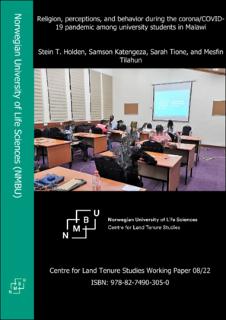| dc.contributor.author | Holden, Stein T. | |
| dc.contributor.author | Katengeza, Samson | |
| dc.contributor.author | Tione, Sarah | |
| dc.contributor.author | Tilahun, Mesfin | |
| dc.coverage.spatial | Malawi | en_US |
| dc.date.accessioned | 2022-07-02T07:52:38Z | |
| dc.date.available | 2022-07-02T07:52:38Z | |
| dc.date.issued | 2022-06 | |
| dc.identifier.isbn | 978-82-7490-305-0 | |
| dc.identifier.uri | https://hdl.handle.net/11250/3002313 | |
| dc.description.abstract | This study investigates the covid risk perceptions, information updating behavior related to the pandemic, use of protective measures, especially facemasks, and the demand for vaccines among university students in Malawi. In particular, the study focuses on how religion and belief in prayer as a protective device against covid-19 are affecting perceptions and behavior related to the pandemic. Our findings are from a stratified random sample of 764 students from 48 classes spread across different disciplines and study years for both undergraduate and postgraduate. One-tenth of the students believed that prayer was their most important measure to protect themselves against the pandemic. Students belonging to the Seventh Day Adventists (Baptist) and Pentecostal religions perceived the covid risk to be significantly lower than other students. Students that considered prayer to be the most important protective device also perceived the covid risk to be lower than others; and updated themselves significantly less frequently about the status of the pandemic than other students. Whereas students that perceived their personal health to be at risk updated themselves more frequently about the pandemic. The information updating frequency related to the pandemic and covid risk perceptions were positively correlated with facemask use, including facemask use in church. Those who believed in prayer as a protective device were using facemasks less frequently. Students belonging to the Seventh Day Adventists and Pentecostals were less likely to use facemasks in church. These two student groups represent close to 30% of our sample; and these two groups are less likely to have tried to get vaccinated or having gotten vaccinated. These two groups are therefore at higher risk themselves in future corona waves and may also, due to their beliefs and behavior enhance the spread of the virus. Our findings may be useful for targeting efforts to promote more corona safe behavior. | en_US |
| dc.language.iso | eng | en_US |
| dc.publisher | Norwegian University of Life Sciences, Ås | en_US |
| dc.relation.ispartofseries | CLTS Working paper;08/22 | |
| dc.rights | Attribution-NonCommercial-NoDerivatives 4.0 Internasjonal | * |
| dc.rights | Attribution-NonCommercial-NoDerivatives 4.0 Internasjonal | * |
| dc.rights.uri | http://creativecommons.org/licenses/by-nc-nd/4.0/deed.no | * |
| dc.subject | Corona/COVID-19 | en_US |
| dc.subject | Pandemic | en_US |
| dc.subject | University students | en_US |
| dc.subject | Religion | en_US |
| dc.subject | Behavior | en_US |
| dc.title | Religion, perceptions, and behavior during the corona/COVID- 19 pandemic among university students in Malawi | en_US |
| dc.type | Working paper | en_US |

